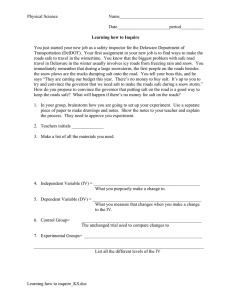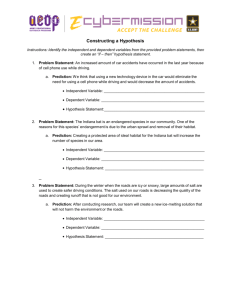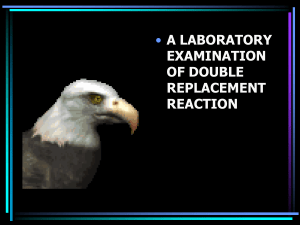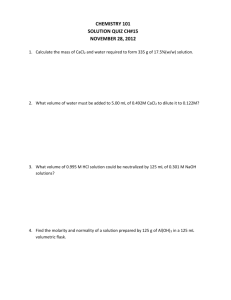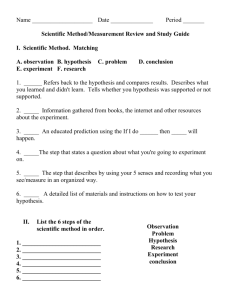Physical Science Name_____________________________________ Date_______________________period__________
advertisement
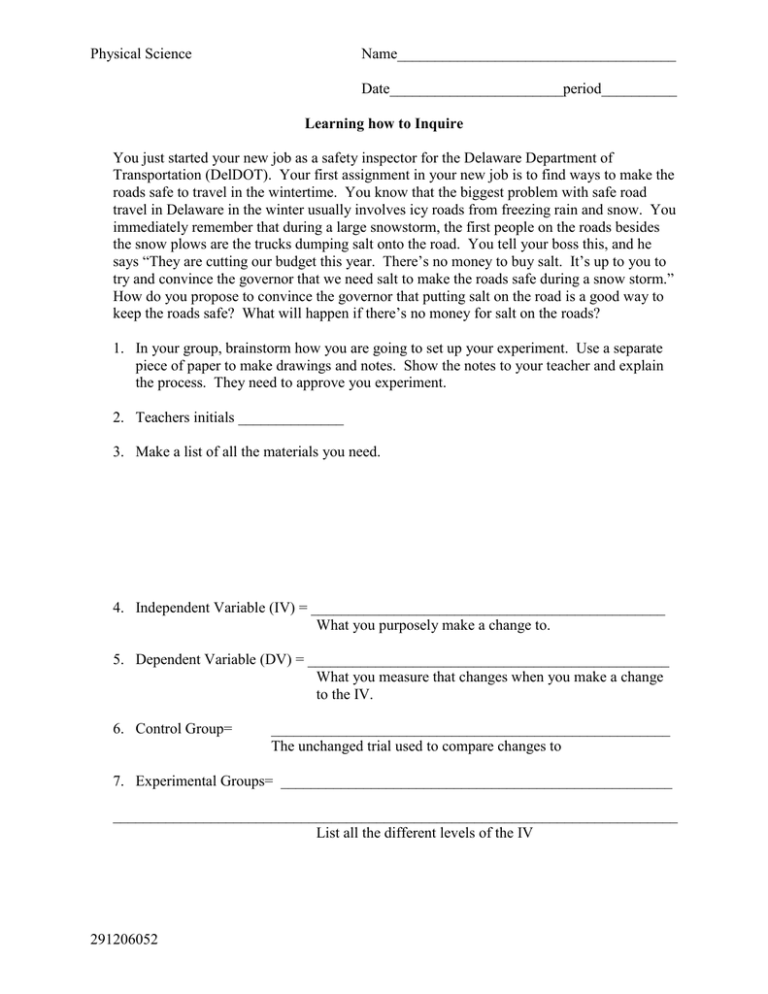
Physical Science Name_____________________________________ Date_______________________period__________ Learning how to Inquire You just started your new job as a safety inspector for the Delaware Department of Transportation (DelDOT). Your first assignment in your new job is to find ways to make the roads safe to travel in the wintertime. You know that the biggest problem with safe road travel in Delaware in the winter usually involves icy roads from freezing rain and snow. You immediately remember that during a large snowstorm, the first people on the roads besides the snow plows are the trucks dumping salt onto the road. You tell your boss this, and he says “They are cutting our budget this year. There’s no money to buy salt. It’s up to you to try and convince the governor that we need salt to make the roads safe during a snow storm.” How do you propose to convince the governor that putting salt on the road is a good way to keep the roads safe? What will happen if there’s no money for salt on the roads? 1. In your group, brainstorm how you are going to set up your experiment. Use a separate piece of paper to make drawings and notes. Show the notes to your teacher and explain the process. They need to approve you experiment. 2. Teachers initials ______________ 3. Make a list of all the materials you need. 4. Independent Variable (IV) = _______________________________________________ What you purposely make a change to. 5. Dependent Variable (DV) = ________________________________________________ What you measure that changes when you make a change to the IV. 6. Control Group= _____________________________________________________ The unchanged trial used to compare changes to 7. Experimental Groups= ____________________________________________________ ___________________________________________________________________________ List all the different levels of the IV 291206052 Physical Science Name_____________________________________ Date_______________________period__________ 8. Constants (list 3)= ________________________________________________________ ___________________________________________________________________________ Variables that could change and have an effect on the experiment but are made to stay the same 9. Problem question: ________________________________________________________ ___________________________________________________________________________ What is the effect of the (IV) on the (DV)? 10. Hypothesis (If then statement) If ____________________________________________ State how the IV is going to be changed Then_____________________________________________________________ State how the DV changes 11. Procedure: Write a numbered step by step procedure to answer the problem question. Include how the IV(__________________) will be changed, how you will measure the changes to the DV(_______________) and how you will record your measurements. 291206052 Physical Science Name_____________________________________ Date_______________________period__________ Data Table: The effect of on CaCl2 Water Temperature Amount of CaCl2 Water Temperature Water Temperature Change in Temp o o (Measured in scoops) ( C) before adding ( C) after adding (oC) CaCl2 CaCl2 (after 2 min.) Beaker #1 (___scoops) Beaker #2 (___scoop) Beaker #3 (___scoops) Beaker #4 (___scoops) Beaker #5 (___scoops) Analysis 1. State the purpose of the experiment: ______________________________________ _______________________________________________________________________ (The purpose of the experiment is to determine the effect of the (IV) on (DV)) 2. State what the results are (put the results of your data table into words): 3. What are repeated trials? 4. Why are they necessary? 5. How many repeated trial did we have? a. What could you do to make the repeated trials more reliable? 6. Create a graph of your results on a separate piece of paper. These results are found in your data table. The title of the graph will be the same as the title of the data table. Conclusion: Write a brief summary explaining why you got the results you got. Include the following in your conclusion: 291206052 Physical Science Name_____________________________________ Date_______________________period__________ State the problem, in the form of the question you are answering The purpose of the experiment was to determine the effect of the …. (independent variable)… on the….(dependent variable). Restate your hypothesis. State whether or not your results supported your hypothesis The data showed that …(Describe how the dependent variable responded to the independent variable.) Is there anything that went wrong? Did you get the results you expected? State any improvements you could make to the experiment next time. 291206052 Physical Science Name_____________________________________ Date_______________________period__________ Learning how to Inquire Teacher Notes 1. Place the materials on lab tables or have students retrieve them and take them to their desks Materials for each group: 5 - 250 mL beakers with 100 mL of H2O Spoon/spatula Thermometer Stirring rod Pile of CaCl2 (enough to get 10 "scoops") 2. Lead Students through first page. This may be the first time they have ever done inquiry. You will need to teach the meaning of most of the terms. IV: Stress this is the quantity that you control the changes to. DV: Stress that is the quantity you measure the changes in that are due to the changes in the IV. Control: The beaker that does not have CaCl2 added to it. Stress that this would tell us if there were any outside factors that changed the temperature. Constants: Have students list as many things that could change such as the amount of water in the beakers that we control to keep the same. Problem question: And Hypothesis Procedure: Use the variables to show how knowing the variables can lead to an easy format for a problem question and hypothesis. Stress that the students never should write the words independent and dependant variable in the question but must use them. This is done best as a class discussion and writing the steps on the board and including mistakes. Then when the experiment is over you can go back and show how the experiment can be revised and refined as well as how these mistakes can be discussed in the conclusion. Data Table: Show how the variables can be used to create a data table 3. Do the experiment either as a demonstration or as a follow along or have student follow the procedure they wrote. 4. Lead students through the analysis and conclusion. Analysis: Should be a minimum of 4 sentences that use the data to state what happened. Conclusion: Stress this is their best "guess" as to why what happened did happen. Students have a tendency to restate what happened. Also you will want them to think 291206052 Physical Science Name_____________________________________ Date_______________________period__________ about what possibly went wrong, how that can be improved and any applications (I use applications for extra credit) 291206052 Physical Science Name_____________________________________ Date_______________________period__________ Student Information Sheet IV: This is the quantity that you control. DV: This is the quantity you measure. These changes are due to the changes in the IV. Control: This is the sample with nothing added to it. This would tell us if there were any outside factors that changed the temperature. Constants: This list should include all the things that must not change (such as the amount of water in the beakers) so that the results are fair. Problem question: And Hypothesis Procedure: Use the variables to show how knowing the variables can lead to an easy format for a problem question and hypothesis. You should never write the words independent and dependant variable in the question but must use them. We will do this on the board as a class. Then when the experiment is over we can go back and see how the experiment can be revised and refined as well as how these mistakes can be discussed in the conclusion. Data Table: Show how the variables can be used to create a data table Analysis: Should be a minimum of 4 sentences that use the data to state what happened. Conclusion: This should be your best "guess" as to why what happened did happen. Don’t just restate what happened. Also, think about what possibly went wrong, and how you could improve on it. 291206052
